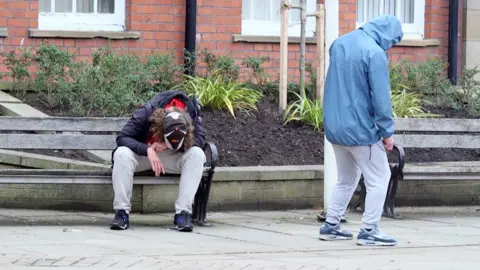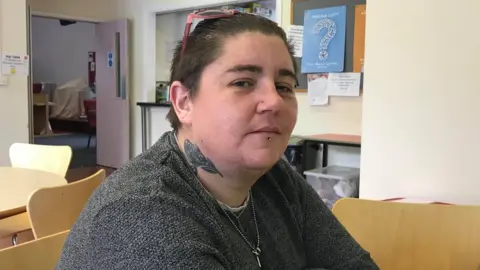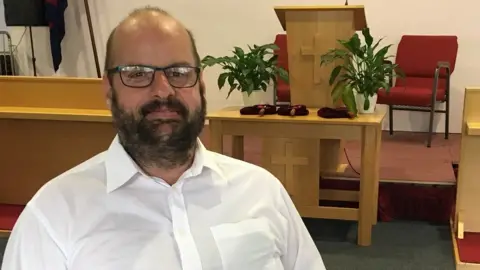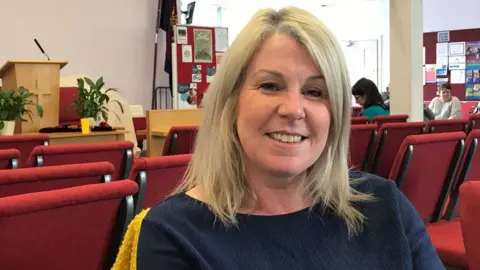The Salvation Army: Wrexham's homelessness 'one-stop shop'
 BBC
BBCWhen a bus driver shared photos of the effects of drug taking in Wrexham, it attracted national publicity.
It is home to some 135,600 people and has become known as "Spice Town". A short distance from the town's bus station, where the photos were taken, is the Salvation Army.
Its services include help with employment, "gamblers anonymous" and a food bank.
Its Community Care Hub provides "a one-stop shop for every service that people may need". The drop-in every Friday brings together the Department for Work and Pensions, GPs, chiropodists, health visitors and mental health, housing and crime reduction teams. The Salvation Army are there to offer a friendly chat and a hot drink.
The hub is the brainchild of GP Karen Sankey who had become "increasingly disillusioned with modern general practice". With help from The Salvation Army, the Association of Voluntary Organisations in Wrexham (AVOW) and the Community Care Collaborative (CCC) she started the initiative at the beginning of 2018.
The hub's work has been highlighted by First Minister Mark Drakeford, who dropped in to praise the team. On average it supports 60 people each week who are homeless, sleeping rough or have mental health or substance misuse problems. In the last financial year, 850 people accessed its services.
Community manager Karen Edwards is one of two full-time paid members of the Wrexham branch. She said some people initially come just for the tea and toast, but eventually access a GP and a chiropodist, and arrange benefits.
Other local authorities and police forces across England have visited to see how they work.

'I want to make a better person of myself'

Helen, 38, said she started taking drugs when she was 11 and it progressed when she discovered amphetamines at the age of 15.
She met her boyfriend and gave birth to "a beautiful baby boy", who is about to turn 20. When her relationship with her son's father ended she turned to drugs and "shamefully" gave her son up to her sister, a decision she will "always regret".
In 2004 Helen went into detox and was clean for 18 months until she relapsed and spent some time on the streets, but now she has been off drugs for six months.
"I volunteer here now and I've seen other people living their life without drugs and they seem to be quite happy... they've come out the other side, and I want a piece of that."
She has been using the hub's services for the last year and was able to access a counsellor and has kept a housing tenancy.
"That's why I volunteer, what I've [taken] out of the community by being a layabout, being on drugs, but now it's about giving back and trying to help people less fortunate.
"Me and him [her son] get on a lot more, the counselling helped a lot... I do feel lost sometimes, but I come here [to The Salvation Army] most days if I need to, just to potter around ...people don't judge."

'If I wasn't here I'd be drinking 24 hours a day'
 The Salvation Army
The Salvation ArmyIn 2013 Mark and his boyfriend moved to north Wales from Northern Ireland, but ended up living on the streets for a year and a half after falling on hard times.
They started using The Salvation Army's Thursday morning breakfast drop-in and slowly he was able to turn things around.
They got accommodation in 2014, but Mark lost his boyfriend in a car accident in 2016 and suffered a set back in his recovery. He said "life went to the dogs" and he was "back drinking" and became seriously ill with pneumonia.
"I've been helping out here now... I do like it here, it gives you purpose. If I wasn't here I'd be drinking 24 hours a day."

'It's a very punitive system'

Dr Sankey has been a GP for 24 years, but she feels modern general practice is "not fit for purpose", particularly for vulnerable groups, who tend to "just fall through the cracks".
"We have no rules, it's open door, open access, no appointments, anybody can come in and access help."
She said a large part of their work is cutting back on duplication.
"Historically getting your benefits could take three months because you have to get a sick note from the GP and remember to take it to the job centre, whereas now I can do a sick note, they go to benefits and it is done in 10 minutes.
"[It's a] race to get GP appointments these days, which anybody who is articulate and can access a phone struggles to do, and then you've got to remember to go the appointment and if you turn up late, you get told you can't be seen.
"It's a very punitive system, they get punished a lot for not following rules."
She said there were still "huge gaps" but they hope to make people feel valued.
"People that still use drugs and are on the streets come here on a Friday and feel like they have a purpose. This is their safe place, they say they feel respected."
